Randy Alcorn's Blog, page 6
July 28, 2025
What Will the Eternal Heaven Be Like? My Interview on Remnant Radio

Scripture has much to say about God’s eternal kingdom on the New Earth. His original plan for us, to rule the earth to the glory of God, was never abandoned. In fact, what was laid out in Genesis 1-2, the first two chapters of Scripture, is precisely what is finally realized in Revelation 21-22, the last two chapters. Christ’s redemptive work wasn’t to snatch away people’s souls to live forever in an angelic realm, but to redeem our whole persons, including our bodies, and the fallen world in which we live. God promises not only new bodies, but a New Earth! (See 2 Peter 3:13.)
In my years of writing about Heaven, I’ve found there are dozens of questions I'm repeatedly asked. But here are the top five:
Will we still be ourselves, with our memories of this life?
Will we know our loved ones and have ongoing relationships with them?
What will we do, and won't Heaven be boring?
Will we have bodies and eat and drink and travel and explore and play—in other words, will we live truly human lives?
Will there be animals—and is it possible that the pets we've loved will be there?
Speaking of questions about Heaven, I enjoyed answering several during my conversation with Josh Lewis and Michael Rowntree, on their podcast The Remnant Radio.
You can watch the full video here:
https://www.youtube.com/watch?v=yqJxrUR24Xw?si=DiJlgE-ijSYIeTlF
If you’d like to jump to different questions we covered, here is what we discussed:
7:53 What is the difference between the Present Heaven and the New Earth?
15:06 Where do people go when they die?
19:10 What about Hades and its relationship to Hell?
25:15 Will we have a personal identity in the resurrection? Will we be ourselves on the New Earth?
33:18 What about gender and marriage on the New Earth?
40:49 What about roles, leadership, and government on the New Earth? 46:28: Will there be animals on the New Earth?
52:51 Will animals talk on the New Earth? What about meat eating?
1:05:35 If there are realities Scripture reveals about the age to come, should we try to apply them to life on the earth right now?
Recommended Reading
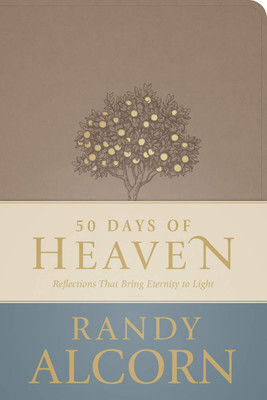 50 Days of Heaven (Special Edition)
50 Days of Heaven (Special Edition)  Everything You Always Wanted to Know About Heaven
Everything You Always Wanted to Know About Heaven  Heaven
Heaven
July 25, 2025
Find Your Identity in God, Not Your Suffering

We live in a time when we are defined as disabled, bipolar, alcoholic, ADHD, victims of lupus, cancer, Parkinson’s disease, and nearly everything else. Our condition easily becomes our primary reference point.
I am an insulin-dependent diabetic, but my disease doesn’t define me. I learn what’s necessary, take care of myself, and live. I shouldn’t become preoccupied with a disease any more than with a career, a hobby, possessions, or a retirement program. I want Jesus Christ first, and my family second, and then my church and ministry to define my life.
David Powlison, now with the Lord, wrote,
People will often express their care and concern by inquiring about your health. That’s good, but the conversation easily gets stuck there. So tell them openly about your sickness, seeking their prayers and counsel, but then change the direction of the conversation by telling them what your God is faithfully doing to sustain you with ten thousand mercies. Robert Murray McCheyne wisely said, “For every one look at your sins, take ten looks at Christ.” ...For every one sentence you say to others about your cancer, say ten sentences about your God, and your hope, and what he is teaching you, and the small blessings of each day. For every hour you spend researching or discussing your cancer, spend ten hours researching and discussing and serving your Lord.
We are to receive comfort from God and His people, and then we are to give that comfort to others. People who pour themselves into loving God and other people find their identity becomes clear. They rest in the fact that God has a purpose and plan for their lives, and they are here as God’s ambassadors and ministers to meet the needs of others. This is critical to our sense of identity. God, not suffering, should define who we are.
Recommended Reading
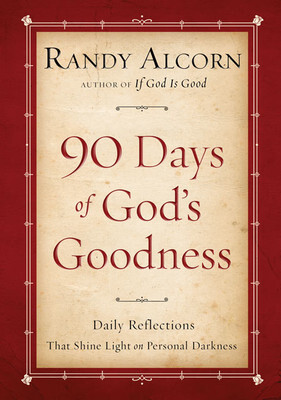 90 Days of God's Goodness
90 Days of God's Goodness 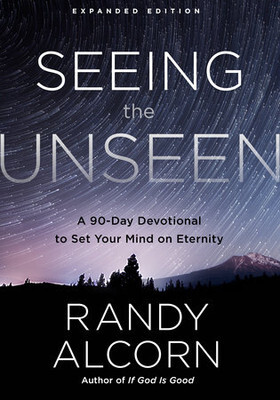 Seeing the Unseen, Expanded Edition
Seeing the Unseen, Expanded Edition 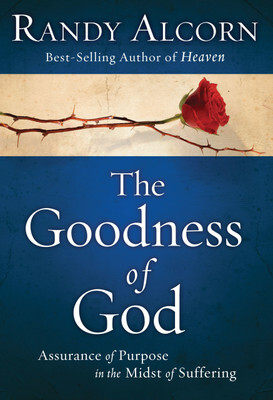 The Goodness of God
The Goodness of God
July 23, 2025
How Can I Discern Whether a Certain Christian Book or Podcast Is Good to Read or Listen to?

Note from Randy: This Q&A appeared in the latest issue of our ministry’s magazine. My thanks to EPM staff member Stephanie Anderson for her answer.
Question from a reader:
How can I discern whether a certain Christian book or podcast is good to read or listen to? I have a hard time knowing which ones hold to good teaching and honor what's found in Scripture.
Answer from Stephanie Anderson, EPM staff:
We are to be like the Bereans, who carefully checked the Apostle Paul’s teachings against Scripture to discern whether what he said was true (see Acts 17:11). Scripture also tells us to “test all things. Hold on to what is good” (1 Thessalonians 5:21).
Our ministry frequently receives questions about whether we/Randy are familiar with a particular resource, and the following are some evaluative tips we often use.
In evaluating books, it can be helpful to check a book's Amazon page, and see who it is published by and also who has endorsed the book. Reading customer reviews (both the positive ones and the negative ones!) can give you an idea of the book's content as well as potential pitfalls.
In her article Becoming a Discerning Christian Reader, Brandi Davis offers these tips:
Check the author’s social media and/or website. If you see ungodly fruit there, it will most likely show up in what they write.
Research the publisher of the book. Some publishers target a very specific Christian demographic, and knowing more about them may help you make a clear decision.
Read a sample. Many online booksellers allow you to read the first few pages of a chapter on their website.
In the case of a podcast, consider looking through their website and episode descriptions. See what guests have been on the podcast. After sampling some episodes, here are some questions to ask:
Does this podcast lead me to have a deeper love for God and His Word?
Does this podcast point me to Christ and help me to know and love Him more?
Does this podcast help me obey Philippians 4:8 (thinking about whatever is true, noble, right, pure, lovely, and admirable)?
Could my time be better spent studying/ listening to other resources?
Randy writes, “Our theology tends to come from whatever we trust.” We want to encourage readers to be wise and careful in what they put their trust in.
In his article 15 Discernment Diagnostics, Kevin DeYoung writes, “Mature Christians do not cast a critical eye on everyone and everything a hair’s breadth different from them. But they are discerning, and they are careful.”
Recommended Reading
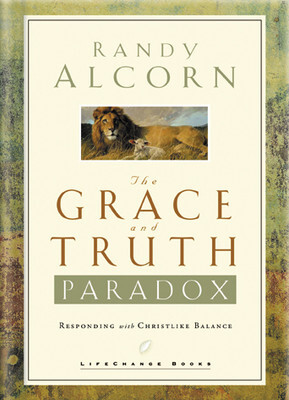 The Grace and Truth Paradox
The Grace and Truth Paradox
July 21, 2025
Our Unforgettable Family Gathering before Nanci’s Death, and Saying What Needs to Be Said to Loved Ones

In March 2022, after four-plus years battling colon cancer, and praying for healing daily, Nanci and I decided it was time to end the treatments, which weren’t effective anymore. We planned a final vacation together. Nanci was excited to make that last journey, but God had another journey in mind.
She took a turn for the worse, and nine days before she died, Nanci told me that she felt she didn’t have much time left in this world, and she wanted to speak into the lives of our kids and especially our five grandsons. (She called our daughters “the girls,” our grandsons “the guys,“ and our sons-in-law who are both named Dan “the Dans.”) So I reached out and asked our family to come within two days to gather around Nanci for what would be the final (in this world) gathering of our tribe of 11.
Honestly, I can’t imagine a more Christ-honoring sendoff and short-term goodbye of a loved one than God kindly gave us. It was truly all I could’ve hoped for and prayed for. Nanci heard words of deep love and respect from her children and grandchildren, sons-in-law, and husband.
For weeks she had hardly been able to speak a sentence without a nagging cough (her colon cancer had moved to her lungs and a third of her lungs had been surgically removed). But that day God gave her strength to share words of love and encouragement. She spoke to us for 15-20 minutes. It was Christ-centered and remarkably clear, and she spoke way longer than she had for months. God gave her a voice and His breath.
Nanci spoke to each of the people in the room, including our daughters and sons-in-law and grandsons, and she had something in particular to say to each, from her heart, as she called them by name. There were many tears, but also laughter, and it was Nanci’s laughter that gave permission and blessing to ours.
With her permission, I then read various powerful segments from her handwritten journals. This included her own profound thoughts from meditating on Scripture, as well as many verses and great quotations she had written in her journal.
This was not a normal journal. She would write a sentence or two about what the doctor had to say at an appointment, and then a page or two about a Scripture passage. For example, she had read Psalm 119:91, which says “All things are God’s servants,” then wrote in her journal about “My Cancer is God’s Servant.” I read that and various other things “Grams” had written in her journal.
I reminded our family that she had written everything I was reading to them, so I was simply the mouthpiece, and all these words and insights came from her, not me. Not only were the rest of us encouraged by what she had written, she was. It was a dream come true to have every member of the family there in that room.
That day some of our family got up and going at 8:30 AM, and by 11 AM we all came into the bedroom where Nanci was in her hospital bed. We didn’t end until 8:30 PM. Nanci slept a fair amount of the time after our morning gathering and at the end, when it was time to pray over her, she was still asleep. But we all laid hands on her and each member of the family prayed, very different and beautiful prayers. It was so incredibly heartwarming.
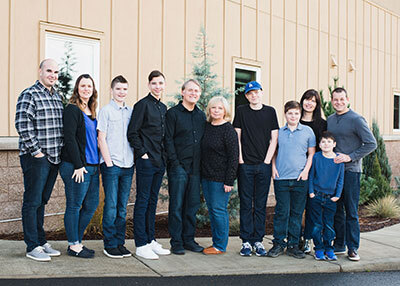 The beautiful thing was that all of them had earlier—either in the group of 11 of us, or one-by-one coming in to talk to her during the day—crowded into our bedroom and personally shared their love for their Grams and a temporary goodbye, which we know will be followed by eternal reunion.
The beautiful thing was that all of them had earlier—either in the group of 11 of us, or one-by-one coming in to talk to her during the day—crowded into our bedroom and personally shared their love for their Grams and a temporary goodbye, which we know will be followed by eternal reunion.
What an emotional and meaningful and truly unforgettable time! Nanci's desire was to have an eternal impact on the lives of her grandsons, and her life did that, but that day was the culmination of her life.
Nanci told them, “Boys, don’t ever become bitter at God for what He chooses to do. He loves me even more than you or than I love myself and He knows what's best. Trust Him no matter what hard things you go through in your life. He will always be there for you.”
One of our seventeen-year-old grandsons sat beside his Grams, listening to her struggling to speak powerful words and hearing me read amazing words from her journal. After hearing words of life, commitment and trust from his grandmother for forty minutes, he said to her, “Grams, if you can trust God facing this [suffering and death], I know I can trust Him in whatever I’ll go through in my life.”
Another teen grandson told her, “I will never forget what you said to us today, Grams.” The others in their own ways made it clear they felt the same.
It was all embodied in those thoughts she wrote to God in her journal and allowed me to read. The family members were blown away to hear in her own words the depth of her trust in the love and sovereignty of God. So much Scripture and so many quotes from Charles Spurgeon are woven into her journal, way more than personal details of things that were happening in her life. In her journal, Nanci said twenty times more about God than she did about herself.
Seven days to the hour after we finished our time listening to Nanci and praying over her, and everyone was back home, I was alone with her and holding her hand when she died. There was a flood of relief for her and of joy for her. And of course, a river of grief, but it was not a flood because I had been going through grief for her for years. I was, and am, so incredibly happy for and proud of her for how she served and honored Jesus in this life and affected the lives of people all around her. I thank God every day for the blood-bought assurance of eternal reunion with Him, and with her, and with each other.
In light of the coming resurrection of the dead, the apostle Paul could say, “Where, O death, is your victory? Where, O death, is your sting?” (1 Corinthians 15:55).
I realize not everyone gets the chance to have a final gathering with their family. But I do encourage anyone who has a terminal illness to use your remaining time to have God-honoring interactions with your loved ones and say whatever needs to be said while you still can.
One of the greatest gifts you can bestow on your loved ones is the honest anticipation of reunion in a better world, the one for which we were made. In fact, even if you’re not terminally ill, if you have something you’d wish you had said to your loved one before they or you unexpectedly die of a heart attack, stroke or accident that could happen any time without warning, let me suggest that you say it to them today or if not, as soon as possible. Next month may not be soon enough.
Hopefully both you and that loved one will still be around for a while. But the time will certainly come when they or you won’t be around. So be realistic. Use your time wisely now to speak into the lives of those around you.
For those who love Christ, the separation brought by death will be brief; the reunion will be everlasting and incredibly sweet. For God‘s people, the best is yet to come. We never pass our peaks in this life, we won’t reach our peaks until the resurrection and once we reach those peaks, we will never pass them, unless it is because our capacity for joy will keep forever expanding.
The kind of family gathering I’m talking about could also win the hearts of any family member struggling with their faith or who might be prone to suffer greatest grief when you die. You can give them words of assurance they will hold onto.
“Brothers, we do not want you to be ignorant about those who fall asleep, or to grieve like the rest of men, who have no hope. . .. God will bring with Jesus those who have fallen asleep in him. . . . We who are still alive and are left will be caught up together with them. . . . And so we will be with the Lord forever. Therefore encourage each other with these words.” ( 1 Thessalonians 4:13-14, 17-18)
Recommended Reading
 90 Days of God's Goodness
90 Days of God's Goodness  Heaven
Heaven  The Promise of the New Earth
The Promise of the New Earth
July 18, 2025
The Love and Trust of a Horse, and John Wesley’s Relationship with Horses

In Creatures Like Us, Lynne Sharpe explores the awareness and sensitivity of horses to their environment and the emotions of people around them. She’s found that horses possess a phenomenal ability to decipher human emotional cues and read body language.
Friends can discuss with one another over a cup of coffee what seems to be going on in the life of a mutual friend. Obviously, the horse cannot do this. (In fact, horses probably don't even like coffee.) But their horse may have a deeper intuitive knowledge about the human that rides them than that person’s friends do. The friends might miss the signs of a suicidal depression that the horse can clearly sense, even though they cannot communicate it, except perhaps to the one whose eyes they look into—and God gave horses just the eyes that might save their human’s life.
If you’ve experienced the love and trust of an animal, whether it’s from a horse, a dog, a cat, or any other kind of animal, you know it’s profoundly moving. And no wonder, since God has coupled mankind and the animal kingdom, not only through the order of creation, with humans immediately following animals on the sixth day, but also through His mandate that we govern the animals (Genesis 1:26).
One of our EPM staff shared this video with me of a woman’s deep connection with her horse:
https://www.youtube.com/watch?v=RC5jjlo6BbE?si=P41Em5PI17iDgtix
That video makes me think of the 18th-century evangelist and theologian John Wesley (1703-1791) who spent an unbelievably large portion of his life on horseback as he rode from town to town, preaching the gospel in farmer’s fields and land surrounding coal mines. Since Wesley spent so much time with horses, he knew them well, and was grateful to the God who so clearly loves and praises them. He knew God had good reasons for making animals, including transporting him to maybe twenty times more people in his lifetime so that they could hear him preach the gospel.
At a conservative estimate, he preached more than 40,000 sermons, some to congregations in excess of 20,000. He regularly preached four or five times a day. His sermon register from January 1747 to December 1761 reveals that he delivered 7,000 sermons on 1,354 texts.It’s been calculated that Wesley traveled on horseback an astounding 250,000 miles, the equivalent of ten times around the entire earth.
In his journal, Wesley recorded on March 17, 1746:
I took my leave of Newcastle...my horse was exceedingly lame. …We could not discern what it was that was amiss; and yet he would scarce set his foot to the ground. By riding thus seven miles, I was thoroughly tired, and my head ached...I then thought, "Cannot God heal either man or beast, by any means, or without any?" Immediately my weariness and headache ceased, and my horse's lameness in the same instant. Nor did he halt any more either that day or the next!
I can see John Wesley practicing his sermons with and praying for his horse as he rode 25 miles day after day, occasionally as many as 90 miles, to preach three times and move on. Wesley’s closest companions were horses (who were no doubt grateful he was 5’3” and weighed only 128 pounds!).
He wrote in his journal:
Nearly thirty years ago I was thinking, “How is it that no horse ever stumbles while I am reading?” (History, poetry, and philosophy I commonly read on horseback, having other employment at other times.) No account can possibly be given but this: because then I throw the reins on his neck. I then set myself to observe; and I aver, that in riding above a hundred thousand miles, I scarcely ever remember any horse (except, two, that would fall head over heels anyway) to fall or make a considerable stumble while I rode with a slack rein. To fancy, therefore, that a tight rein prevents stumbling is a capital blunder. I have repeated the trial more frequently than most men in the kingdom can do. A slack rein will prevent stumbling if anything will. But in some horses nothing can.
After he had fed, watered, and brushed his mount, I could easily see Wesley at a campfire reading Job 39:19-25 to his horse from the Bible carried in his saddlebag (which he often read and memorized as he rode). I’d guess he read too from Revelation 19:
Then I saw heaven opened, and a white horse was standing there. Its rider was named Faithful and True…His eyes were like flames of fire, and on his head were many crowns…He wore a robe dipped in blood, and his title was the Word of God. The armies of heaven, dressed in the finest of pure white linen, followed him on white horses… On his robe at his thighwas written this title: King of all kings and Lord of all lords. (Revelation 19:11-16)
Recommended Reading
 50 Days of Heaven (Special Edition)
50 Days of Heaven (Special Edition) 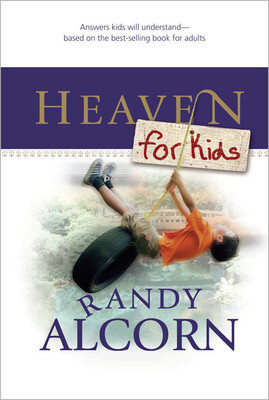 Heaven for Kids
Heaven for Kids  The Promise of the New Earth
The Promise of the New Earth
July 16, 2025
When Prayers Go Unanswered

Note from Randy: I was looking for some resources to share with a friend who is struggling with unanswered prayer and came across this excellent article from Stand to Reason. I was surprised to see the author’s reference to my book If God Is Good, but in my defense I loved and appreciated the article before reading her mention of it! 😊
Writing about unanswered prayer, Wayne Grudem says, “When prayer remains unanswered, we must continue to trust God, who ‘causes all things to work together for good’ (Rom. 8:23 NASB) and to cast our cares on him, knowing that he continually cares for us (1 Peter 5:7). We must keep remembering that he will give strength sufficient for each day (Deut. 33:25) and that he has promised, ‘I will never fail you nor forsake you” (Heb. 13:5; cf. Rom. 8:35-39).’”
I hope you find this article from Amy Hall encouraging.
Making Sense of Unanswered Prayer
I was recently asked, “Why do you think some prayers are unanswered despite their heartfelt, sincere, and unselfish motives?” (Greg and I responded to this on the #STRask podcast here.)
I don’t think we can know why God answers some particular prayers the way we want and not others, though we can know the two main goals God is working towards in and through our lives regardless of how he answers:
His glory: Sometimes God reveals his glory by answering our prayers the way we hoped, but sometimes he reveals his glory through our learning to depend on him as we experience his faithfulness and trustworthiness through an unchanging trial (see 2 Cor. 1:8–9, for example). He uses our life situations to make himself known to us and to the world, to draw others to himself, etc. No matter how he responds to our prayer, we can be confident he is working to reveal his glory more fully to us. As Ephesians says, his goal is to show us the riches of his grace for eternity (2:4–7), to the praise of his glory (1:6).
Our good: Romans 8:28 makes it clear God is working all things for our good, but 8:29 defines exactly what that good is: becoming like Christ. (And of course, our seeing more of his glory also works for our good!)
Since we know he has promised to reveal himself in such a way that we will enjoy the riches of his grace for eternity, and he has also promised to work everything for our good (i.e., to fulfill his purpose for us, which is to make us like Christ), we know that every answer to every prayer is working towards those two goals, even if we can’t see how his answer is accomplishing those things.
In light of those promised goals, I can think of two reasons why his responses to our prayers might seem perplexing to us at times:
First, we might not have enough knowledge to evaluate his response to our prayer. Since he’s omniscient, he knows much better than we do how to accomplish his two great goals, so his answers to our prayers could look very different from our expectations (which we developed with very limited knowledge).
Second, we might have different, lesser goals in mind when we pray (for example, our comfort, or even the easing of our distress, when such things are requested in situations where they will not actually serve God’s two great goals for us). If we evaluate God’s answers in light of our own, lesser goals, his answers won’t make sense because he has different, greater goals for us than we have for ourselves.
The above is an intellectual response to the question, but of course, an intellectual understanding of unanswered prayer and comfort in the midst of it are two different things. Sometimes grief just has to be gone through, and the best we can do is try to bear up under it in a way that brings us closer to God rather than pushes us away from him. When it comes to unanswered prayer, the only thing that can sustain us is trust in God’s sovereignty, goodness, and specific love for each of us:
God’s sovereignty: We need to trust in his sovereignty so we can rest in the knowledge that he has a reason for not giving us what we’ve asked for. We can only know there’s a reason for our suffering if we also know he could change our situation but isn’t—that our lives are not out of his control, filled with meaningless pain. (This is why God answers Job’s distress with a statement of his sovereignty.)
God’s goodness and specific love: We need to trust in his goodness and his love for each of us as his specific son or daughter so that we know there is not only a purpose, but a good purpose behind our situation—that he hasn’t forgotten us, that he truly loves us and wants the best for us, and that we’re not merely pawns in his plans.
That kind of trust in both his sovereignty and love for us as specific individuals (not just the world in general) is difficult to maintain in the midst of grief…so difficult. The only way to build up that trust is to think as much and as well as we can about who God is and what Christ has done for each of us. And we can do that by reading both the Bible and other good books that will help us comprehend the reality of God’s love as taught in the Bible. Here are three that have made a difference to me:
Gentle and Lowly: The Heart of Christ for Sinners and Sufferers – This was my favorite book I read last year. The chapters are short and very readable, but it took me a while to get through the whole thing because there was so much to think about and absorb.
Delighting in the Trinity – This is also very readable. The first time I read this, the intensity of the truth of God’s love would actually cause me to turn away from the book at times because it was too much even to take in.
Rejoicing in Christ – This is by the same author as the previous book and does a wonderful job of revealing Christ to the reader.
This is the only path to comfort that I see when prayers go seemingly unanswered—an increased trust in God’s good sovereignty and love. All the books above are about his love since I think that’s the more difficult truth for our hearts to comprehend. In terms of God’s sovereignty over suffering, the book I would recommend is If God Is Good: Faith in the Midst of Suffering and Evil by Randy Alcorn, a book that helped me grasp—in my heart as well as my mind—the truth that evil and suffering are not stronger than God, no matter how much it might feel otherwise to us. The sheer number of stories in that book where God worked through suffering—not just in spite of it, but through it—is a testimony to the truth of God’s sovereignty over evil, and it changed me.
I honestly think the two paragraphs below are the most important I’ve ever written (see the full post here: What Easter Says to Those Who Are Suffering), and they contain the ideas I finally grasped after reading Alcorn’s book:
With the cross and resurrection at its core, Christianity need never deny the reality of evil and suffering because Jesus has proven Himself to be greater than all of it. He didn’t just overcome it, He overcame through it. The cross was the very means by which He secured joy: “[F]or the joy set before Him [He] endured the cross, despising the shame” (Hebrews 12:2). In this same way, all evil will be swallowed up. We will, in our resurrection, see that what we suffered was the means by which we gained joy, and the “eternal weight of glory” produced by our affliction will turn the suffering we experienced into a drop of dye lost in an ocean.
Sometimes we’re tempted to think evil is stronger than God, but when we understand that every attempt evil makes to harm us is working for our good, we’ll see that all of evil’s weapons have been removed from it; there is nothing left it can use against us. [Emphasis added.]
We have been chosen and called by God so that he can shower each of us with the “surpassing riches of his grace” for eternity, all to his glory. Not one of his children is forgotten or passed over. He governs each of our lives carefully and lovingly as our Father. Since we can’t always see the specifics of what he’s doing, we have to live by faith—that is, trust in the things we can’t yet see, a trust that’s based on everything we know to be true about him.
And how can we know what’s true about him? We must learn. And here we come to the bottom line: To persevere through unanswered prayer, study and pray in order to gain the kind of deep knowledge of God’s reality and character that will lead to an unassailable trust in his sovereignty and love for you. This is the only way forward through perplexing pain and seemingly-unanswered prayers.
Originally published at Stand to Reason. Reprinted with permission.
Recommended Reading
 90 Days of God's Goodness
90 Days of God's Goodness  If God Is Good (Paperback)
If God Is Good (Paperback)  The Goodness of God
The Goodness of God
July 14, 2025
Charles Spurgeon’s Surprising Thoughts on Aliens

This may be to many readers one of the most surprising blogs I’ve ever written. And if you follow the links at the end to what I and others have said on this subject, you may be doubly surprised!
I’ve read a lot by Charles Spurgeon, but the 63 volumes of his sermons alone come to 25 million words, equivalent to the 27 volumes of the ninth edition of the Encyclopedia Britannica. Then his 140 books and hundreds of articles in The Sword and Trowel come to something like 18 million more words, making him one of the most prolific writers in history. So when Tony Reinke shared these great and unusual quotes from Charles Spurgeon, I shouldn’t have been surprised that I had never before read them:
“I think it is no stretch of the imagination to believe that as this world is only one speck in the creation of God, there may be millions of other races in the countless worlds around us.”
“It may be true that all those majestic orbs that stud the midnight sky are worlds filled with intelligent beings. And it is much more easy to believe that they are than that they are not, for, surely, God has not built all those magnificent mansions and left them untenanted!”
“I cannot tell you how many races of intelligent beings there are beside the hierarchy of angels, but it is not at all improbable that there are as many worlds as there are grains of sand upon the seashore—and perhaps every one of these teems with inhabitants more than our earth does.”
“It may be that every starry world teems with myriads of intelligent inhabitants—it is much more likely that it should be so than that it should not be so, seeing that God is not in the habit of creating anything in vain.”
After sharing those quotes, Reinke followed with this. I love Tony, and his sense of humor!
Haters gonna say this image is fake. https://t.co/AZUdjCTLr6 pic.twitter.com/IeVKi03R4I
— Tony Reinke (@TonyReinke) June 12, 2025
In response, J. A. Medders, the Director of Theology and Content for Send Network and the General Editor for New Churches, wrote this post, and shared more from Spurgeon:
Aliens. UFOs. Extra-terrerstial beings. Charles Spurgeon?
I was surprised to learn that Charles Spurgeon made comments about the possibility of intelligent life existing beyond our planet. But not too surprised. The man was prolific, opinionated, and bold. When you have more words printed in English than anyone else in history, it means you said a lot of stuff.
So, what did Spurgeon say? Let me give you the quotes and then my commentary.
Spurgeon on Intelligent Beings
We do not know what other races of innocent creatures there may be, but I think it is no stretch of imagination to believe that, as this world is only one speck in the creation of God, there may be millions of other races in the countless worlds around us, and all these may be invited to behold the wonders of redeeming love as manifested in the saints in the day of the Lord. I seem to see these unfallen intelligences encompassing the saints as a cloud of witnesses, and in rapt vision beholding in them the love and grace of the redeeming Lord.
It may be true that all those majestic orbs that stud the midnight sky are worlds filled with intelligent beings; it is much more easy to believe that they are than that they are not, for, surely, God has not built all those magnificent mansions, and left them untenanted. It were irrational to conceive of those myriads of stupendous worlds, vastly bigger than this poor little speck in God’s great universe, all left without inhabitants.
I cannot tell you how many races of intelligent beings there are beside the hierarchy of angels, but it is not at all improbable that there are as many worlds as there are grains of sand upon the seashore, and perhaps every one of these teems with inhabitants more than our earth does.
It may be that every starry world teems with myriads of intelligent inhabitants; it is much more likely that it should be so than that it should not be so, seeing that God is not in the habit of creating anything in vain, and we can scarcely imagine that he has made all those mighty orbs to circle around his throne without suitable inhabitants to render due homage to him.
Read the whole thing, including J. A.’s commentary.
And in case this subject interests you, I too have addressed it at length. Here are some excerpts from my Heaven book, related to a New Universe, other planets, aliens, and space travel, and addressing the question: Is It Possible That in the Ages to Come We Will Travel to Other Planets and Encounter Alien Beings?
You might also like to check out these resources on our site:
How Should Christians Respond to UFOs and Other Unexplainable Phenomena?
Recommended Reading
 Heaven
Heaven  The Promise of the New Earth
The Promise of the New Earth
July 11, 2025
Praying for and Weeping with Those Suffering in Texas

The news out of Texas has been so tragic, where the results of flash floods on July 4 have claimed more than 100 lives. The Guadalupe River rose 26 feet in just 45 minutes, causing extensive damage and loss of life, including the deaths of 27 children and adults at Camp Mystic, a Christian Camp located near the river. Several people from the camp remain missing.
There’s such heartbreak—I’ve been trying to imagine if it were one of our daughters now, and even more so when they were children. Or how would any of us feel if one of these were our grandchild? May we better understand others through putting ourselves in their place, and pray accordingly. What a reminder that all of us live only by God’s mercy.
Matt Chandler shared these prayer points for those affected by the tragedy:
Pray for rescue: Ask God to guide search teams and protect the lives of those still missing. Pray for breakthroughs and safe returns.
Pray for grieving families: Especially families who lost children at Camp Mystic and beyond. Ask for the comfort that only Jesus can give.
Pray for the displaced: Many have lost homes and basic necessities. Pray for provision and resources: food, clean water, shelter.
Pray for first responders: Lift up firefighters, police, EMTs, and volunteers. Ask for strength, wisdom, and protection as they carry unimaginable weight day after day.
Pray for the Church: Pray that local churches would be the hands and feet of Jesus, offering help, hope, and healing in the days to come.
Pray for leadership: Ask God to give local and state officials wisdom to respond well now and prepare wisely for the future.
Pray for God’s presence: That even in the pain, people would experience the nearness of Christ and the hope of the gospel.
The Lord is close to the brokenhearted and saves those who are crushed in spirit. -Psalm 34:18
If you’d like to help those affected through giving, EPM recommends Samaritan’s Purse. Others have also recommended the disaster response of Convoy of Hope.
Several stories of heroism have already been circulating; 27-year-old father Julian Ryan died helping his family escape their flooding home. The director of Camp Mystic, Dick Eastland, died while trying to help campers. News Anchor Ryan Wolf writes, “His final act was one of courage, devotion, and love. For generations, Dick was the heart of Camp Mystic in Hunt, Texas. A steady presence, a father figure, a man of deep faith—he made every girl feel seen, safe, and cherished. He and his wife, Tweety, poured their souls into that camp since 1974. She survived. He did not.”
I believe that on the New Earth we will sit around dinner tables and campfires, hearing and telling stories of heroism that happened in this present world, the one that sometimes seemed so confusing to us. And we’ll get to meet many men, women, and children whom God used to give us little glimmers of His saving grace.
Yet the question that haunts us when something terrible like this happens is, “Why?” In 2010, after the 7.0 magnitude earthquake in Haiti, I was interviewed about If God Is Good, my big book on the problem of evil and suffering, and the interviewer asked: “How do you respond to people who say, ‘How could your God allow this to happen?’” Here’s what I shared:
https://www.youtube.com/watch?v=MbWbBB4dbOU?si=zGuxuNOrSRylZqoQ
Recently I was reflecting on a family I know that has faced what seems to be an inordinate amount of suffering. Only God knows why, but there is a doctrine of recompense that I think goes further than we realize, meaning that those who have experienced the worst suffering in this life will enjoy the most happiness in the life to come. Of course, we will all be 100% happy in Christ’s presence, but I think the capacity for joy on the New Earth is somehow expanded through the suffering of this present time that cannot be compared to the glory that will be revealed in us (Romans 8:18).
Jonathan Edwards and Charles Spurgeon both used an illustration of eternal rewards that two vessels can be filled with water, but one of the vessels may be much larger than the other. The idea is that our faithful service for the Lord, and our suffering in this life, can increase forever the capacity for joy that we will experience in the world to come.
Again, everyone will be filled with joy and 100% happy, and no one will lack delight, but for some who have endured such sufferings and losses in this life, perhaps their joy will be all the greater.
When I was writing If God Is Good, this really made sense to me because otherwise it’s hard to understand what seems like such unfairness due to the unequal suffering of God’s children in this life. But one day we will understand and see in retrospect that Romans 8:28 was true all along, and we will reap the eternal benefits of it.
Recommended Reading
 90 Days of God's Goodness
90 Days of God's Goodness  If God Is Good (Paperback)
If God Is Good (Paperback) 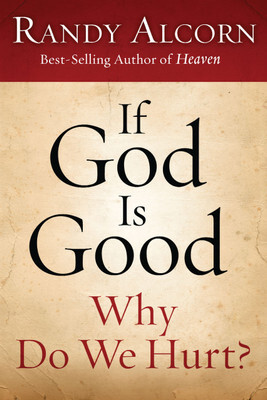 If God Is Good Booklet (10-Pack)
If God Is Good Booklet (10-Pack)
July 9, 2025
The Showdown Moment in Western Civilization: Is Christianity True or Not?

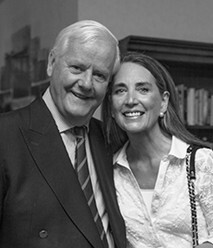 I have the greatest admiration for Os Guinness, a brilliant author and social critic who’s written or edited more than 30 books. I first came to appreciate Os when he worked with one of my favorite authors Francis Schaeffer at L’Abri in Switzerland. While there, living with Francis and his wife Edith, Os wrote his remarkable book The Dust of Death. When Os and I were both speaking at a C. S. Lewis conference in Oxford years ago, Nanci and I had a delightful dinner with him and his wonderful wife Jenny. (More about her and her amazing story at the end of this blog.)
I have the greatest admiration for Os Guinness, a brilliant author and social critic who’s written or edited more than 30 books. I first came to appreciate Os when he worked with one of my favorite authors Francis Schaeffer at L’Abri in Switzerland. While there, living with Francis and his wife Edith, Os wrote his remarkable book The Dust of Death. When Os and I were both speaking at a C. S. Lewis conference in Oxford years ago, Nanci and I had a delightful dinner with him and his wonderful wife Jenny. (More about her and her amazing story at the end of this blog.)
I was struck by this quote from a message that Os, now 83 years old, gave earlier this year about the need for cultural-spiritual renewal in the West. This moved my heart:
We’re at the showdown moment in Western Civilization. Will the radical revolutions regenerate society as they promised, or not? Will the secular enlightenment of liberalism encourage humanity to go forward and progress with reason alone without God, or not? But also…the God of Sinai, the God of the burning bush, the God of the burning mountain, and our Lord with the call of Galilee—are these things true, or not? The Christian faith will not do anything for civilization if it’s viewed as useful. It will do nothing for civilization if we turn it into a psychological version of whatever. It will only be true and effective if it’s understood to be true and you have enough people who are citizens who have an ultimate loyalty to what they see as ultimate reality.
Os also said, “Humans need three things on a personal level: meaning, belonging, and purpose. And there are no deeper answers than the Christian faith, rooted in Judaism.”
Watch the full message here. It’s just 15 minutes long and well worth your time:
https://www.youtube.com/watch?v=_1hI2GIFPig?si=JGBiOiYUhy5eYNmP
Going back to that dinner that Nanci and I had with Os and Jenny Guinness, it also included a driving tour of Oxford, which was unforgettable since Os is a great historian. (We drank wine at dinner, and I had to comment on that because his great-great-great grandfather was Arthur Guinness, the founder of Guinness beer, the Dublin brewery!)
Before our meeting, Nanci was curious about Jenny, wondering how she would dress for the dinner, so she looked her up and found out she had been a cover girl for Vogue magazine. Nanci thought maybe she'd feel totally outclassed, but Jenny turned out to be a gracious sister in Jesus, and she and Nanci really hit it off. There was much laughter, most of it involving Nanci. We had a wonderful time, the way believers can spend only one evening together and yet feel a permanent friendship has been forged, to be renewed in Heaven or on the New Earth. Memories like that, with people in places all over the world, make me miss Nanci all the more and long for the great reunion!
Read Jenny’s testimony here. Or if you want to see her compelling intellectual and cultural insights as well as hear her journey to faith from her immersion in the world of fashion, see this remarkable video. If you listen to it, you may well think of unbelieving friends who could be reached through her powerful story. Os also tells her story in his 2023 book Signals of Transcendence.
Recommended Reading
 If God Is Good (Paperback)
If God Is Good (Paperback)  The Grace and Truth Paradox
The Grace and Truth Paradox
July 7, 2025
New York’s Medical Aid in Dying Act, and the Worth of Each Human Being

Physician assisted suicide is in the news again, with New York lawmakers passing the Medical Aid in Dying Act. The bill is now on Governor Hochul’s desk, and she has not indicated whether or not she will sign it.
On the subject of euthanasia, this is a remarkable article by a man who knows firsthand what it is to face severe physical challenges. Dovie Eistner writes:
I was born with a recessive genetic neuromuscular condition called nemaline myopathy. Over the years, it’s developed to the relatively stable point where I use a portable ventilator to breathe — hence, my blacking out last September — and a motorized wheelchair to get around. I often require assistance with basic tasks. I’m not terminal — at least, not without taking into account that life itself is terminal, for all of us. But many times, my own body can feel like a straitjacket, and that’s without the physical pain that surges from time to time.
I don’t want to die, and God willing, I’ve got another couple of decades left, at the very least. Under the law as proposed, I wouldn’t be eligible, all things being equal. But all things aren’t always equal.
He continues:
Advocates of physician-assisted, when not resorting to subterfuge, insist that the terminally ill who want to live out their remaining days should be able to do so. So what differentiates them from those who advocates say should be allowed to die? Pain, physical or spiritual. And don’t we all suffer pain? Aren’t we all terminal? Six minutes, six days, six weeks, six months, six years, six decades — one day, the curse of Adam will catch up with us all. I’ve lost friends to tragedies who I thought would live 100 years.
Simply put, we don’t know when our time is. If that’s the case, then the logic of assisted suicide leads inevitably to the conclusion that those with doctor-approved expiration dates are living lives not worth living. Lives unworthy of life, as the Nazis referred to people with disabilities when they set out to exterminate us with their Aktion T4 program.
A life not worthy of living. Well, I’ve heard that before. From peers, from rivals, sometimes from myself. I haven’t been suicidal in a good number of years, but I can’t say that about my teens and early 20s. I’ve had my fair share of heartbreak and physical pain that might have crushed many. Yes, no one wants to end up like Tithonus, locked away to wilt and fade while still breathing. But neither should the state of New York give reason for loved ones to abandon the frail. I’m one of the lucky ones. I fear for a world in which life is cheap.
I recommend reading the entire article.
Three decades ago, I joined others, including many physicians, in expending a lot of time and effort to oppose Oregon’s move to become the first place in human history (yes, even before the Netherlands) to legalize physician assisted suicide. We failed, obviously. (In 2014, Oregon was again in the spotlight when 29-year-old terminally ill Brittany Maynard chose to end her life under Oregon’s physician assisted suicide law.)
I wrote a booklet-sized treatment on euthanasia in 1986, citing relevant Scripture. If you’re interested, here it is. I talk about the difference between taking a life and permitting a death, and that we need to be careful not to play God. Most of it, I think, remains as relevant now as it was then.
As Creator and Sovereign, God alone has the ultimate prerogative of giving and taking human life. The worth of each human being is determined not by mental or physical capacities, or tangible contribution to society, but by its intrinsic God-given nature, the fact it is created by Him and in His image. Active euthanasia usurps God’s sole prerogative over human life. In its voluntary form it is suicide; in its involuntary form it is murder.
Recommended Reading
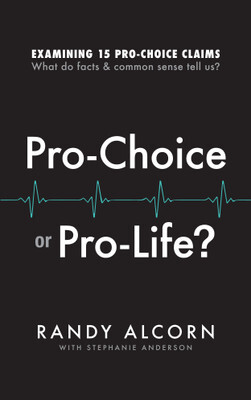 Pro-Choice or Pro-Life?
Pro-Choice or Pro-Life?



